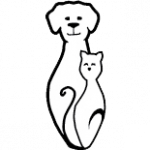Illustrated Articles
-
Glargine (Lantus) insulin is commonly used in cats for the treatment of Diabetes Mellitus and is readily available from most pharmacies with a script, being a human product however, is not licensed for use in cats. Glargine must not be diluted or mixed with anything because the prolonged action is dependent on its pH. Insulin glargine should be kept refrigerated to prolong its life. Insulin glargine has a shelf-life of 4 weeks once opened and kept at room temperature. Opened vials stored in the refrigerator can be used for up to 6 months.
-
Glaucoma is a disease of the eye in which the pressure within the eye, called intraocular pressure (IOP), is increased. Glaucoma is caused by inadequate drainage of aqueous fluid. Glaucoma is classified as primary or secondary. High intraocular pressure causes damage to occur in the retina and the optic nerve. Blindness can occur very quickly unless the increased IOP is reduced. Analgesics to control the pain and medications that decrease fluid production and promote drainage are often prescribed to treat glaucoma. The prognosis depends to a degree upon the underlying cause of the glaucoma.
-
Glipizide is given by mouth and is used off label to treat high blood sugar in cats with mild type 2 diabetes. Give as directed by your veterinarian. Common side effects include temporary vomiting and a lack of appetite. Do not use in pets that are allergic to it or other sulfonamides, or in pets with trauma, infection, diabetic coma, low blood sugar, or diabetic ketoacidosis. If a negative reaction occurs, please call the veterinary office.
-
Glomerulonephritis is an inflammatory condition of one part of the kidneys (glomeruli) that results in excessive urinary protein loss and kidney damage and can cause many life-threatening conditions, including thromboembolic disease. There are many causes though most of the time, no specific cause is identified. Diagnosis involves blood work, repeated urine tests, imaging, blood pressure, and kidney biopsy. Treatments and prognosis are also described in this handout.
-
Glucosamine/chondroitin combination is a nutrient supplement that is given by mouth and is used to treat osteoarthritis and feline lower urinary tract disease. Give as directed by your veterinarian. Side effects are uncommon but may include gastrointestinal upset. Do no use in pets that are allergic to it. If a negative reaction occurs, please call your veterinary office.
-
Glutamine is given by mouth and is used off label to treat gastrointestinal and pancreatic inflammation. It can be prescription or over the counter. Give as directed by your veterinarian. Side effects are uncommon and are not well documented in pets. Use cautiously in pets that are pregnant or nursing or have severe liver disease, severe behavior disorders, or seizures. If a negative reaction occurs, please call your veterinary office.
-
Griseofulvin is given by mouth and is used on and off label to treat skin, hair, and nail fungal infections. Give as directed by your veterinarian. Common side effects include lack of appetite, vomiting, and diarrhea. Do not use in pets that are allergic to it, pregnant pets, breeding males, pets that have severe liver disease, or in cats with FIV or FeLV. If a negative reaction occurs, please call your veterinary office.
-
Grooming a cat can be a challenge to many people. Depending on coat/hair type, medical conditions, and lifestyle factors, some cats will need different levels of grooming care than others. A well-groomed cat is a sign of overall good health, and regular grooming can help you notice problems early on.
-
Gui Pi Tang (GPT) adresses Heart BLood Deficiency secondary to Spleen deficiency, commonly resulting in tachyarrhythmias or mental symptoms such as anxiety, insomnia, memory loss, nervousness, poor vision, and frequent dreaming. The underlying Spleen deficiency may be hinted at by a history of weight and appetite loss, loss of balance, diarrhea or fatigue. The other main use of GPT is as a hemostatic agent for bruising, epistaxis (bloody nose), and uterine bleeding ( due to platelets). Its use should be avoided in "damp" patients ( greasy coat, weight gains, ear infections, mucoid discharges).
-
Head down. Eyes averted. Shoulders hunched. Tail thumping the floor. Body retreating. Your pet looks guilty, maybe even apologetic, right? WRONG! Your pet’s body posture and attitude do not indicate guilt or remorse but represent a response to your body posture and attitude.

